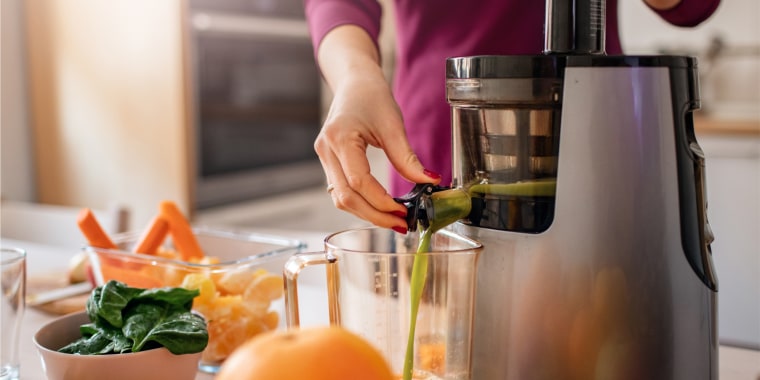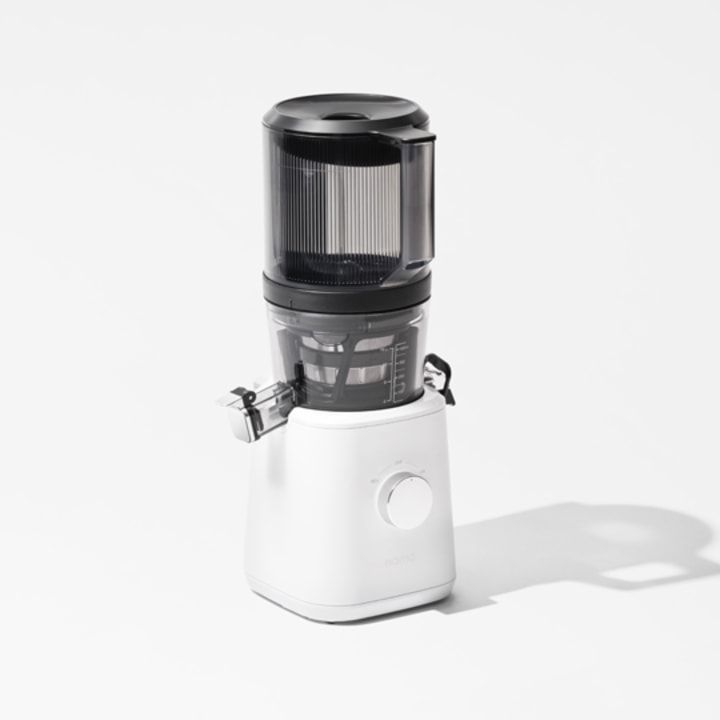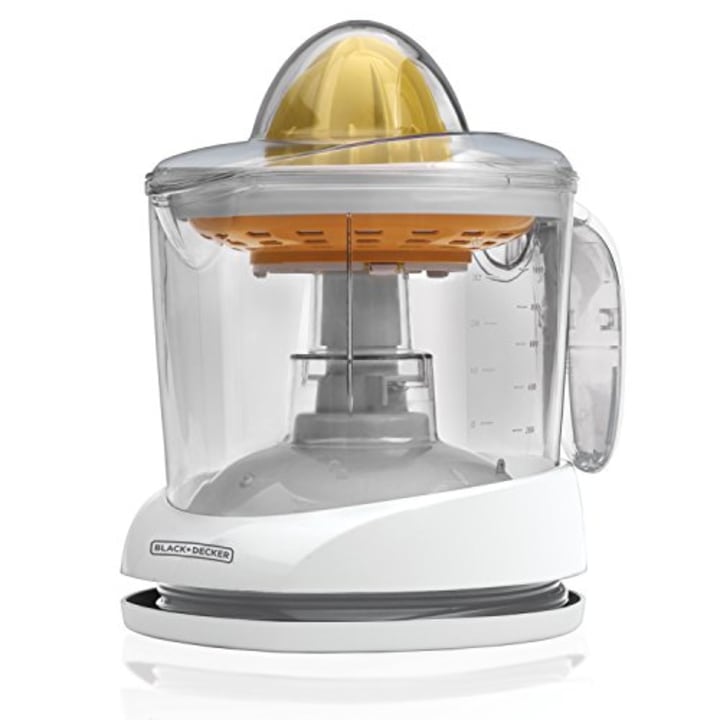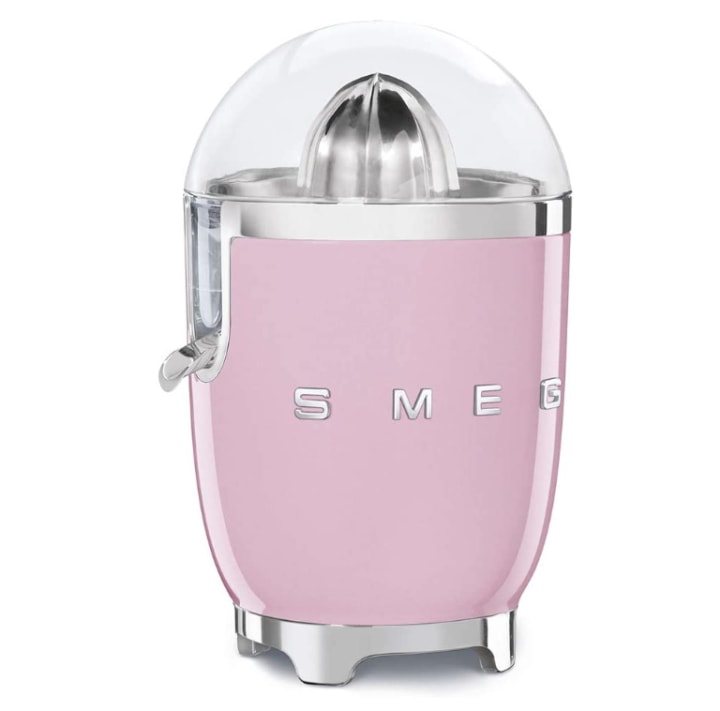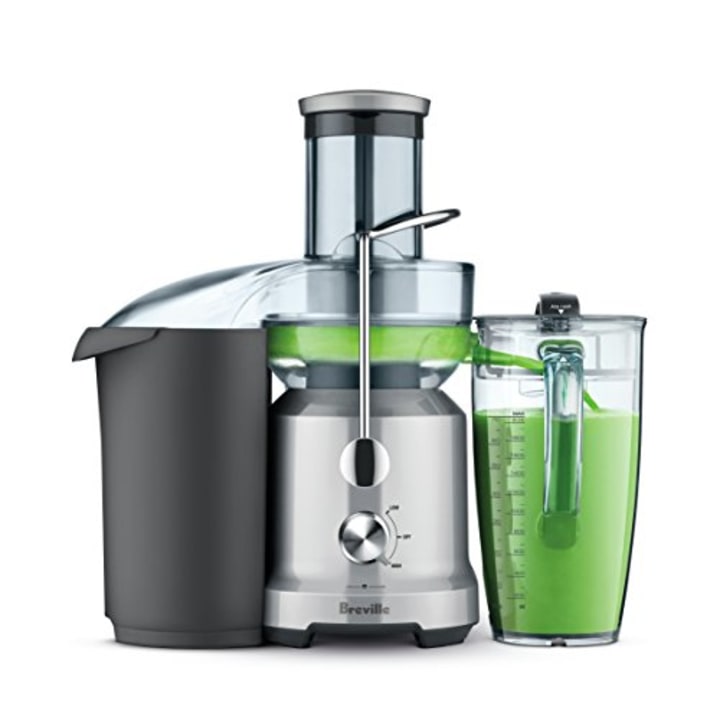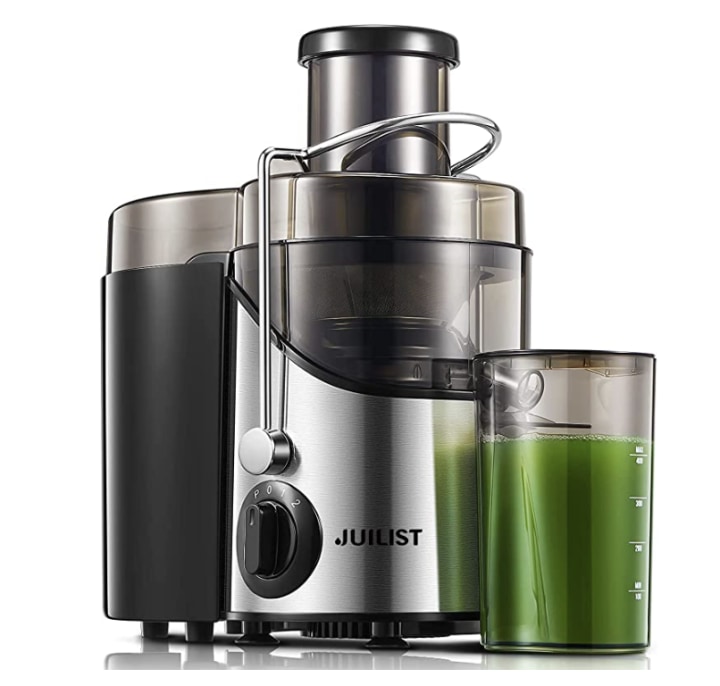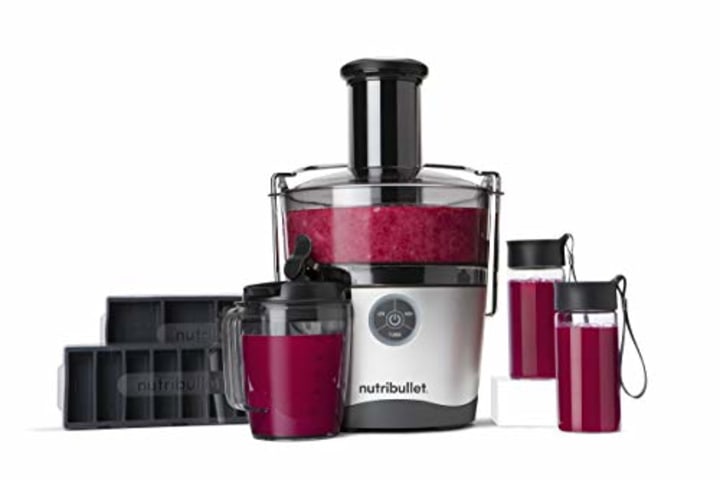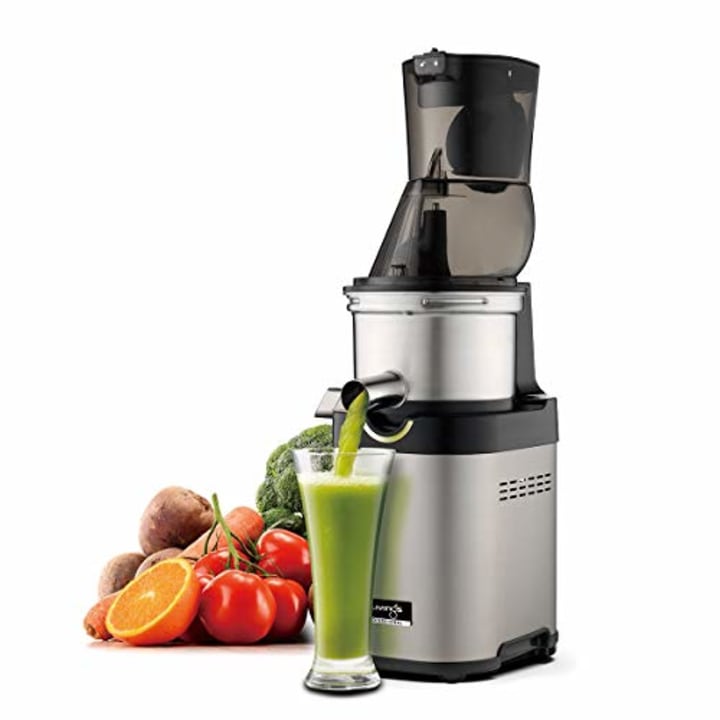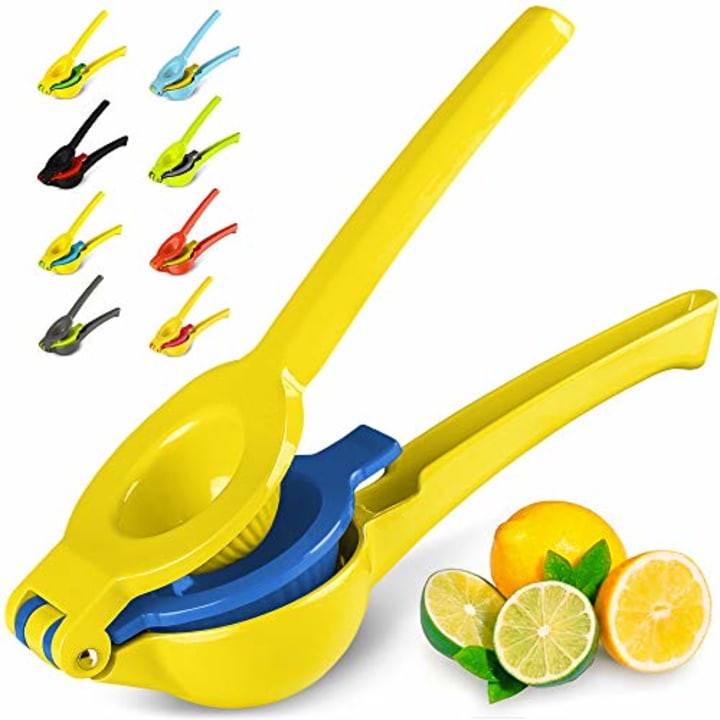Juicers simplify the path to fresh juice, allowing you to achieve a fresh cup in minutes — without having to run to your local deli. By using a juicer at home, you can be selective with what produce you choose to include and can customize just how much of your fruits and veggies you actually use. Drinking fresh juice also comes with health benefits; for example, citrus juices typically pack vitamin C, carrot and beet juices are rich in vitamin A and leafy-green based juices are rich in iron, according to experts. “Juices can be considered an excellent way to boost vitamin and nutrient intake," says Ariane Resnick, a certified nutritionist. "Having one midday as a pick-me-up instead of a caffeinated beverage makes a great snack anytime.”
If you’re thinking about investing in a juicer or upgrading your current model, we talked with experts about what features to look out for when shopping and how to tell which appliance is best for you.
SKIP AHEAD Different types of juicers, explained | The best juicers | How to shop for a juicer | What are the health benefits of owning a juicer?
Our top picks
- Best overall/editor’s pick: Nama Cold Press Juicer
- Best budget pick: Cuisinart Compact Juice Extractor
- Best splurge: Breville Juice Fountain Cold Centrifugal Juicer
How we picked the best juicers
Every juicer below is either expert-recommended or highly rated with an average of four-stars or higher and in line with our expert guidance. Here are other factors we kept in mind:
Type of juicer: Different types including juice presses, masticating juicers and centrifugal juicers (more on this below) have different pros and cons. For example, if you need a fast juicer that’s suitable for both fruits and veggies, you’ll want to consider buying a centrifugal juicer; if you’re looking for something that retains nutrients and pulp, consider opting for a masticating juicer.
Maintenance: Every juicer we recommended features dishwasher-safe components for easy cleanup.
Weight: Juicers can be as light as two pounds or come in closer to 20 pounds. Most juicers on our list weigh less than 12.5 pounds.
Different types of juicers, explained
We spoke with experts to help you break down the different kinds of juicers on the market right now. All of our picks fall into one of the below categories, each of which have their own benefits.
Centrifugal juicer: This is the most common type of juicer — also referred to as a ‘fast’ juicer. These appliances feed large pieces of produce through the center of a machine; they can juice a variety of fruits and vegetables and are often more expensive than other types of juicers on our list.
Juice presses: This is considered the best juicer from a nutrition standpoint because it packs more vitamins in a finished batch of juice (thanks to its pulp) than a traditional centrifugal juicer (which has little to no pulp), but they are very costly and harder to use, according to Resnick. These generally work in two steps: First the machine grinds the produce, then it presses your fruit or vegetables through a mesh envelope separately.
Manual juicers: These are handheld tools that squeeze the juice out of the fruit. They’re the most affordable options, but are limited in the type and quantity of juice they can produce — they’re typically only used for limes and lemons.
Electric juicers: Electric juicers are faster than manual juicers and are easier to use. They typically use a spinning reamer (the cone that juts out at the top) that you press the citrus down on to extract the juice.
Slow juicers or masticating juicers: These models “chew” the produce at a slower speed and force the juice through a fine stainless steel strainer. They’re similar to centrifugal juicers in that they juice a variety of fruits and vegetables. Despite the name, these typically produce juice at the same speed as a centrifugal juicer but are much quieter (and pricier). They also produce less food waste due to their lower speeds.
The best juicers
To help you find the right juicer for your dietary needs and lifestyle, we compiled highly rated options across price points that are all in line with our expert guidance.
Best Cold Press Juicer: Nama
Nama Cold Press Juicer
The Nama Cold Press is a favorite of Resnick’s because she can blend her juice and clean her appliance, all within 15 minutes. “You don't have to cut produce into little pieces, and you feed everything in all at once as if it were a blender,” she says. It’s also hands-free, so you can multitask in the kitchen while it runs, according to Resnick. This model comes with multiple strainers, so you can make juices, smoothies and even nut milk with it too. Plus, it comes with a detachable pulp container and a brush for easy cleanup.
Type: Cold Press | Speed: 50 rpm | Juice capacity: NA | Weight: 12.1 lbs | Dimensions: 9.8 x 9 x 17.7 inches
Best affordable electric citrus juicer: Black + Decker
Black + Decker 32-Ounce Citrus Juicer
This electric juicer can hold up to 34 ounces in its base — which is larger than most other picks on our list. This model, which has a 4.4-average star rating from over 20,000 shoppers has a pressure-activated citrus reamer (the jutting yellow cone up top) so you can start the juicing process by simply pressing fruit against the cone, according to the brand. The drip-free spout also lets you use the juicer as a pitcher to pour drinks without transferring the liquid into another vessel. Pulp collects in a separate basket for easy removal and cleanup too. Plus, there is a plastic storage cover that allows you to protect your juicer from dust and dirt when it’s not in use.
Type: Cold Press | Speed: 50 rpm | Juice capacity: 34 ounces | Weight: 2.12 lbs | Dimensions: 9.8 x 9 x 17.7 inches
Best electric citrus juicer: Smeg
Smeg Citrus Juicer
Like many of Smeg’s other kitchen appliances, this juicer has a retro flair. It’s got a 4.6-star rating from over 400 shoppers and you can extract juice from lemons, limes, oranges and even grapefruits. It has a built-in sensor that activates when a fruit is pressed down on the reamer and the juice flows into a drip-free bowl that is dishwasher safe, according to the brand. You'll also get a dome-shaped lid cover to protect your juicer when it’s not in use. Customers say it’s easy to clean, and that it stays put on your counter while it functions, minimizing any juice sprays.
Type: Electric juicer | Speed: NA | Juice capacity: 20 ounces | Weight: 6 lbs | Dimensions: 7 x 7 x 11 inches
Best centrifugal juicer for families: Breville
Breville Juice Fountain Cold Centrifugal Juicer
This centrifugal juicer is bigger than other models on our list and has the largest juice capacity at 70 ounces. It’s one of Resnick’s favorites, as it's easy to store and works quickly. This is because it has a 3-inch wide chute to juice whole fruit (no cutting up produce beforehand), according to the brand. The Juice Fountain Cold has two speeds: 13,000 rpm and 6,500 rpm, making this the fastest juicer on our list. The brand recommended using the higher speed for denser fruit and vegetables and the lower speed to juice leafy vegetables and soft fruit. This model also comes with a jug that you can easily seal and refrigerate for up to three days, according to the brand.
Type: Centrifugal juicer | Speed: 13,000 rpm and 6,500 rpm | Juice capacity: 70 ounces | Weight: 11 lbs | Dimensions: 13.6 x 8x 16.7 inches
Best affordable centrifugal juicer: Juilist
Juilist Juicer Machines
If you’re interested in getting into juicing but aren’t ready to shell out a chunk of cash, this affordable juicer is perfect for you. It’s also a favorite of Lisa Moskovitz, a registered dietician. She says it’s easy to store and clean, and can prepare a drink within minutes. This model can juice both soft fruits like oranges and watermelon and hard vegetables like carrots, and can hold up to 20 ounces of liquid, according to the brand. It has a 3-inch wide chute, a stainless steel body and three-speed settings, and comes with a cleaning brush and has dishwasher-safe accessories for easy cleanup too.
Type: Centrifugal juicer | Speed: 50 rpm | Juice capacity: 20 ounces | Weight: 7 lbs | Dimensions: 11.8 x 11.5 x 14.2 inches
Best centrifugal juicer: Nutribullet
NutriBullet Juicer Pro
NutriBullet is best known for its blenders, but its highly rated juicer is also worth knowing about. It comes with three speeds, and two different-sized chutes to accommodate produce. Use the lower speed setting for soft fruits like kiwis, and the turbo setting for harder veggies like beets. The pulp basin and spout are also dishwasher-safe and removable. I gifted this one to my mom who loved the added to-go bottles and freezer trays, which allowed her to store her freshly made juice for a couple of days. She could also juice citrus fruits like oranges and even smaller fruits like strawberries with ease. Some assembly is required when you first receive the product, but it’s relevantly simple, according to her.
Type: Centrifugal juicer | Speed: slow, high, turbo, rpm NA | Juice capacity: 27 ounces | Weight: 7.5 lbs | Dimensions: 17.4 x 12.83 x 12.13 inches
Best masticating juicer: Kuving
Kuving Whole Slow Juicer Master Chef
This high-end commercial juicer (which means it can produce juice in large batches, and is ideal for big families) is a favorite of Erin Swain, a mixologist and restaurant beverage program curator. Swain's a fan because she can use it without having to first cut up her produce. “Clean-up has always been quick and easy,” Swain says. It rotates at slower speeds (60 pm) compared to centrifugal juicers and has a wide 3.5-inch feed chute, which can juice vegetables and fruit, including lemons, limes and carrots, according to Swain. Like other options on this list, there’s also a coarse strainer that allows you to get more pulp out of your juice, according to the brand. Additionally, the juicer comes with a strainer-cleaning tool and two additional cleaning brushes to help you keep it clean. Swain says she’s used this juicer for nearly five years, so you know it’s built to last.
Type: Masticating juicer | Speed: 60 rpm | Juice capacity: 48 ounces | Weight: 20 lbs | Dimensions: 7 x 10.5 x 20 inches
Best manual juicer: Zulay
Zulay Premium Quality Metal Lemon Lime Squeezer
This manual citrus press comes with two handles that you’ll squeeze down on, and a middle piece to keep the fruit’s seeds from falling out into your bowl. This juicer is dishwasher-safe and compact (at only 3 inches wide) for easy storage with the rest of your kitchen supplies. Since it’s completely manual it doesn’t require a battery or an electric source to operate. Nearly 40,000 Amazon customers also gave it a 4.7-star rating, though some noted that the metal chips over time. This model is ideal for anyone looking to only juice citrus fruits like lemons, limes and oranges for salad dressings, cocktail mixers and cold remedies.
Type: Manual juicer | Speed: NA | Juice capacity: NA | Weight: 0.74 lbs | Dimensions: 8.6 x 2.9 x 2 inches
How to shop for a juicer
We consulted experts about what features to consider when shopping. They recommended keeping the following in mind:
Find a juicer with minimal components as it will reduce cleanup and increase your chances of actually developing a regular habit (more on the health benefits of juicing below).
Juicers range in size. Think about how much storage you have and how much juice you’ll make in a typical batch. The highest yield we’ve mentioned is 70 ounces.
Some juicers make a considerable amount of noise. Centrifugal juicers sound similar to a blender, while masticating juicers are much quieter.
Some models come with storage containers that are refrigerator safe and attach to the model for easy use.
Juicers operate at different speeds; slower juicers can operate at as little as 43 rpm and deliver more pulp as they operate by crushing the fruit/vegetable into juice, while faster, centrifugal juicers can clock in at 13,000 rpm and usually leave little to no pulp behind. Slower juicers also retain a higher nutrient content, according to our experts.
Prices vary based on your model type. Manual juicers will typically cost under $25, while electric juicers can range from $30 to $150. Centrifugal juicers typically cost anywhere from $100 to $200, and masticating juicers will usually run between $250 to close to $500.
What are the health benefits of owning a juicer?
Juice can help you incorporate vitamins and nutrients like Vitamin A and C into your diet, says Resnick. That said, it's not the same as eating a piece of fruit, as juicing removes fiber, she says.
If you plan to begin incorporating juices into your diet, Resnick recommends using them as a meal supplement instead of a meal replacement, as juice alone won’t provide all of the nutrients and fiber your body needs.
Juices also have a high sugar content, though there are benefits to adding them to your diet. “While juice might have more sugar (albeit natural sugar) in a serving than fresh fruit and veggies, you're also getting inflammation-fighting antioxidants, essential micronutrients like vitamin C and potassium, as well as hydrating fluids,” says Moskovitz. Citrus fruits, leafy greens and apples are all nutrient-rich options to consider using.
Celery juice, despite rising popularity, isn't a magical solution to healthy living according to our experts. "The celery juice fad is complete nonsense," Resnick says. "Celery juice is as good and beneficial as any other green veggie juice, no more or less so, and it has no magical properties."
Is a juice cleanse good for you?
While adding juice to your diet can help you get your daily use of vitamins, Moskovitz recommended staying away from liquid diets or juice cleanses. “The issue is that juices often tend to be concerningly low in protein, which is essential for tissue recovery and repair.” she says. Juices are also low in calories, which can affect energy, mood and performance, according to Moskovitz.
“If you want to incorporate more juice in your diet, try it as a snack or in addition to solid food meals. That way your body can still receive sufficient balanced nutrition including protein, fat and fiber,” she says.
Meet our experts
At Select, we work with experts who have specialized knowledge and authority based on relevant training and/or experience. We also take steps to ensure all expert advice and recommendations are made independently and without undisclosed financial conflicts of interest.
Pat Crocker is the author of “The Juicing Bible.” She’s written 24 cookbooks and is a culinary herbalist, teaching workshops on healing tinctures, salves, and teas.
Lisa Moskovitz, RD is a registered dietitian, author of “The Core 3 Healthy Eating Plan,” and the CEO of NY Nutrition Group.
Ariane Resnick is a certified nutritionist. She’s also a recipe developer and has written about nutrition, health, wellness and identity for various outlets including The Kitchn, Livestrong and Simply Recipes.
Erin Swain is a sommelier, mixologist and beverage program curator. She hosts a wine education podcast, mixology virtual classes and is a contributing wine writer at Hearst magazines.
Why trust Select?
Hanna Horvath is a personal finance reporter based in New York City and a former contributor to NBC Select.
Nishka Dhawan is an associate commerce editor at NBC Select. For this article, she interviewed nutritionists, dieticians and culinary experts on the dietary benefits of juicers and how to shop for them.
Catch up on Select's in-depth coverage of personal finance, tech and tools, wellness and more, and follow us on Facebook, Instagram and Twitter to stay up to date.
